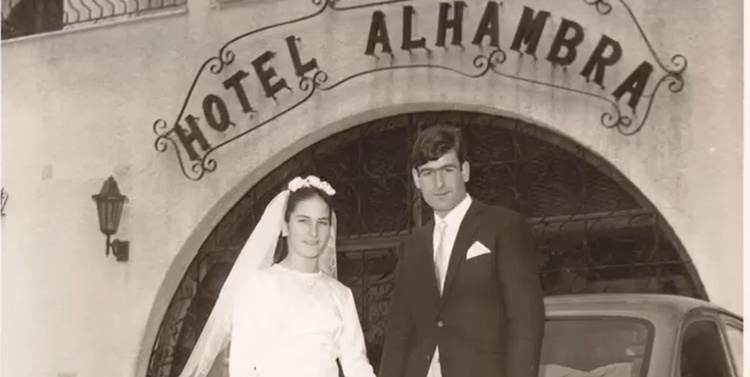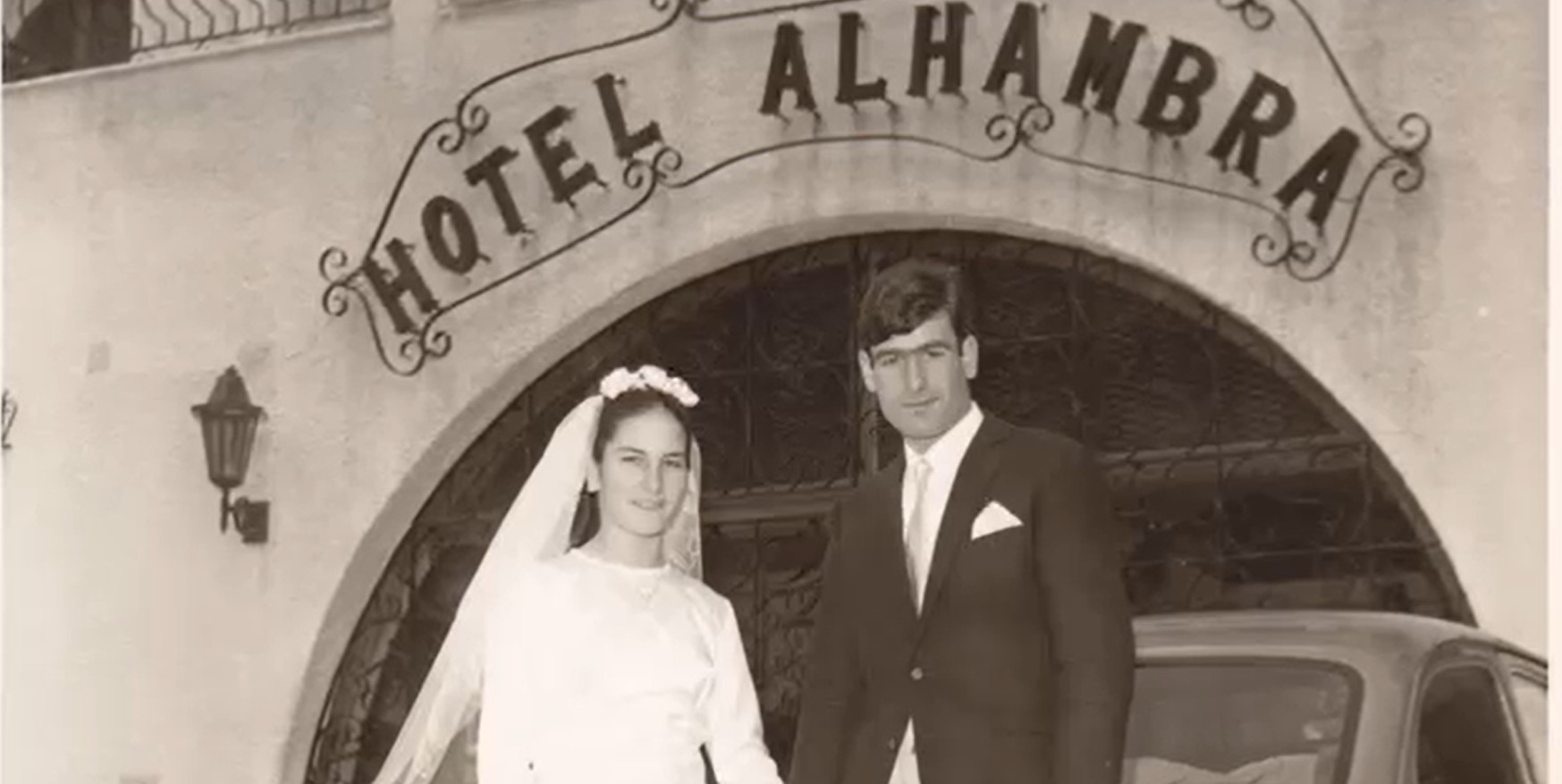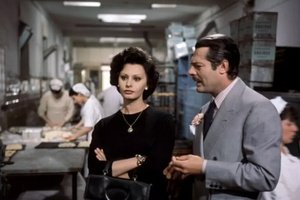Sam becomes noticeably absorbed in the storytelling; however, he suddenly stops speaking when he turns the page to reveal a double page spread of one particular photo. It is of Maria, his wife at the window of her childhood home in Monasterace, a small town in Cosenza. Sam is lost in his own quiet reverie. Then he collects himself. He doesn’t provide much more detail other than to explain, “it’s how I used to see her, alla finestra (at the window)”.
The photo is taken of Maria during one of their more recent trips back to the village. She has an almost wry smile, with a touch of shyness in her eyes. She gazes out from a window of her family home just as she used to do daily when growing up. Tradition dictated that girls were not allowed to venture from the home so her view from the window was her only link with the outside world. A world, as it turned out, which was full of adventure.
Sam used to see her when he walked by in the village – he would take up any opportunity to pass by in the hope of catching a glimpse of Maria. He became friends with her brothers – again, with the speranza (hope) that this would be a way of getting closer to the young girl at the window.
Sam flicks through pages of a beautifully presented book that his daughter, Pina, prepared a few years ago as a loving tribute and biographical piece for her parents. It’s full of photos, special moments, recounting the sadness at the loss of loved ones, and those left behind. It also traces a remarkable story of the risk Sam and Maria took in establishing their now very successful business.
Sam left his small town in Italy as a young man. He yearned to make something out of his life and his home country did not offer much at the time. Farming was fine, but not under the conditions he endured with his family in Monasterace. There was no electricity, and water had to be diverted from a river to be used for the farm. Meat was scarce, and food was inadequate and simple. At 21 years of age, Sam finally packed up what belongings he could and set sail for Australia, arriving on the Achille Lauro in 1967. His wife, Maria, at only 16 years of age, arrived in 1969.
Within two days of arriving in Melbourne, Sam found himself cleaning out chicken sheds at a processor in South Morang along with relatives. The plan was to work at the plant for a short time whilst he found his feet. However, chickens became the theme for his vocation in Australia. In fact, Sam Cuteri has now become known as “the chicken man”, creating an extremely successful business in the food industry. Of course, Maria, his wife has been a partner in every sense.
Sam knew he wanted to marry Maria, the girl with whom he flirted as she looked down at him from the window. He took a risk and sent her messages and letters through a network of relatives and friends whilst in Australia. He sometimes heard back. He had hope. In 1967 he decided it was time to take another risk, to return to Italy to ask for Maria’s hand in marriage. Fortunately, her father agreed, even though her older brother was not too happy about the union.
Sam and Maria were married at the Santuario Basilico di San Francesco di Paola and enjoyed a few months of wedded life in Monasterace before they both embarked for Australia. Sam was happy to be starting his new life with Maria in a new country. His young wife on the other hand, was a little nervous but resolute, “I had nothing, so everything became special.” In fact, in listening to Sam, it seems she has always had a way of making things special.
Life was hard. Sam and Maria were torn between their commitment to their families back in Italy and wanting to create a stable life for themselves and their children. Sam had an entrepreneurial predisposition. He focussed on learning all he could about the chicken industry and soon started his own side business selling chickens and eggs door to door. From there they steadily built a chicken processing business.
There were many years of tough, complex work for both as they juggled family commitments, loan payments and learning about chicken processing. At a critical time early on in their business development journey, Sam and Maria lost all their chickens to a virus which wiped out their entire stock. However, they kept their resolve and continued to do what was needed to build what is now known as La Ionica. They soon turned a small sideline into a notable business taking some of the market share from Steggles, the major player in the industry. The approach to processing chickens was different to that normally adopted in the market, namely avoiding the use of chemicals.
Like all growing businesses, La Ionica had some rocky times. Nonetheless, Sam and Maria worked together to find a solution to every problem. They were, and still remain, the backbone of the business.
As young ones, the three Cuteri children quietly amused themselves whilst their parents were hard at work. They accompanied their father as he made deliveries and stepped up to assist in the business when older. Around them family members and friends provided support as they settled into different phases of their Australian life. The Cuteri clan place a strong emphasis on family and friendship – they have cared for each other during illness, the passing of loved ones, as well as celebrated milestones such as the birth of several bright-eyed nipotini (grandchildren).
Remarkably, each member of the family has taken a role in ensuring its success – especially when, during one very difficult period, La Ionica was put into receivership. Family collaboration, underlined by a strong family work ethic, paid off and they clawed their way back to ensure a thriving business with a more sophisticated business model.
La Ionica has gone on to gain a strong reputation, and foothold in the market. Diversification into other food items has meant an array of products make up the Turi Food brand, for instance, Montelfiore formaggi (cheese).
The name, La Ionica, is easily identifiable. It is emblazoned across Melbourne Victory jerseys and on AAMI Park banners on match days. Who would have thought the Cuteri journey that started from humble beginnings in Monasterace would lead to being an integral part of football played at one of the finest stadiums in Australia.
Football is a passion shared by Sam and Maria and one that they have shared through sponsorships and support of various football clubs. Their hope is to ensure the sport can be enjoyed by the community, hence their sponsorship of Victory as an A-League Club. Like many other fans, they watch each match intently. During tense match times, you may see Sam closely observing each player and their manoeuvring on the pitch. He might, just for a moment, pace a few steps – hands thrust in his pockets. Always silent. Maria is much more animated.
Anyone who meets this unassuming man will quickly see that Sam lives by his mantra, “No matter how big you get… never forget where you have come from and what made you successful in the first place”. Sam and Maria have not forgotten hardship. There is much to their story, for instance, their contribution to charity which attests to their generosity and sense of social responsibility.
Sam and Maria have always been side-by-side, working hard. They relish in the traditions of their Calabrian heritage. Rather than talk business they will talk about their orto (vegetable garden) and the pickling of their own produce.
Pina, their daughter, will tell you her parents have very different personalities. What is clear is that they have created a very special migrant story. Moreover, an extraordinary family story of hope, risk, and a few amazing adventures.












